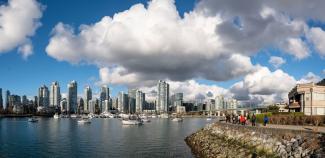Data Science for Social Good


The DSSG program at UBC is an interdisciplinary summer research program that brings together data providers and domain experts to work with talented students (i.e., DSSG Fellows) on data-intensive projects that have the potential to benefit society.
This 14-week, full-time, paid summer program is designed to bring together UBC undergraduate and graduate students from diverse backgrounds with experience in data science, urban research and planning, design thinking and other domains to work on focused, collaborative research projects that have the potential to benefit society.
Please see below for past projects.
This program is open to full-time undergraduate students at the UBC Vancouver campus who have successfully completed 75 undergraduate credits by mid-May 2026, or full-time graduate students at UBC Vancouver campus. While some experience with coding (e.g., Python, R) and/or statistical background is helpful to your application, we welcome applications from students from all backgrounds -- including those from the social sciences and the arts.
Graduate students will require written consent from their thesis supervisor to participate in the DSSG Program. Due to the nature of the DSSG Program, applications from students enrolled in the Master of Data Science will not be considered. Additionally, preference will be given to undergraduate students from any discipline and graduate students from non-STEM fields.
International students are eligible to apply if they will be returning to school full-time in September 2026.
The DSSG Program is eligible for UBC Science and Arts Co-op credits.
Students in certificate or diploma programs are not eligible for the DSSG Program.
Students must be available full-time during the DSSG Program (Monday, May 11 - Friday, August 14, 2026). While the students may be able to work remotely for part of the Program, they will be required to attend and participate in the orientation, presentations, workshops, meetings, etc. in-person. Therefore, it is critical that they are able to commute to the UBC Vancouver Campus on a regular basis and on short notice, and not make travel plans without approvals from the DSI Scientific Director and project sponsor(s) during the Program.
The inaugural UBC DSSG program was launched in 2017 as part of the Cascadia Urban Analytics Cooperative. From then on, DSSG has worked in collaboration with other UBC departments and local organizations.
We honour xwməθkwəy̓ əm (Musqueam) on whose ancestral, unceded territory UBC Vancouver is situated. UBC Science is committed to building meaningful relationships with Indigenous peoples so we can advance Reconciliation and ensure traditional ways of knowing enrich our teaching and research.
Learn more: Musqueam First Nation